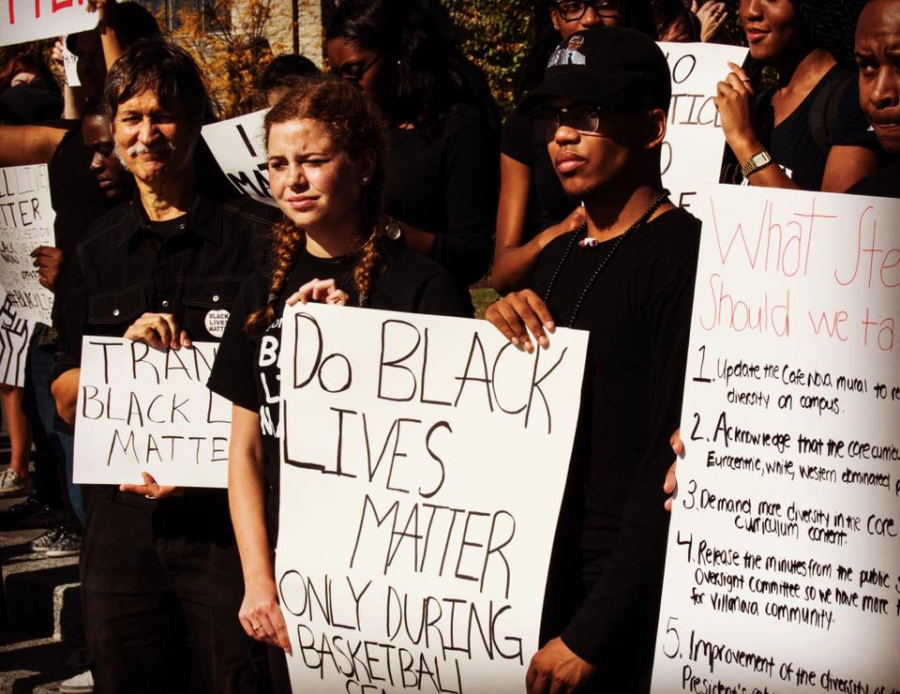OpEd:On ‘Nova basketball and Charles Murray, Do ‘Black Lives Matter’ only during March Madness?
March 27, 2017
March 13 was a day of bitter contradictions at Villanova University. As the men’s basketball team boarded a bus bound for the March Madness tournament, students, faculty and alumni came together to wish them luck before their first game against Mount Saint Mary’s College. The atmosphere was electric—the tournament’s top seed, the Wildcats appeared equipped to defend their national title.
As the excitement unfolded, a handful of University faculty members announced that Dr. Charles Murray, a so-called scholar at the American Enterprise Institute, would be giving a lecture on campus later this March. The invitation of Murray, a known white supremacist, is far from a benign act—it is an attack, not only on the essence of the academy, but also on the humanity of our classmates of color.
A community coming together to celebrate the successes of a team made up of primarily men of color—and yet, a community welcoming to the podium a purveyor of hate, racism and pseudoscience.
Following the violence at his recent Middlebury lecture, academics from both the left and the right have come forward to defend Murray. Cornel West and Robert P. George write, “all of us should seek respectfully to engage with people who challenge our view. . . [who] are prepared to do business in the currency of truth-seeking discourse.”
Similar arguments were made by members of the Villanova community when news of broke of Murray’s lecture. In an Op-Ed for The Philadelphia Inquirer, Professors McGuire and Spiro ask, “Why not listen to Murray and to those challenging him and evaluate the arguments on both sides?” The shibboleth is prevalent. An artfully posed question, we are told, will unravel a career built on a series of wonderfully crafted fictions. Sunlight, we are reassured, will be the best disinfectant.
Murray’s apologists, on both sides of the aisle, fail to grasp the notion that ideas are not de facto worthy of engagement. As explained by the South Poverty Law Center, many of Murray’s ideas stem from his reworkings of “long-discredited theories of IQ and heredity.” In “The Bell Curve,” for example, Murray asserts that the genetic makeup of black Americans is inextricably linked to an “underclass” status, while the same gives cause to the outperformance of white Americans in the “cognitive elite.”
Murray later defends his ideas against allegations of racism, pointing to a single paragraph from “The Bell Curve” in which he explains that both “genes and the environment” constitute “racial differences,” as opposed to genes alone. Such language that dispossesses individuals of their humanity can only warrant our most emphatic rejections, despite whatever calls have been made for ultimately futile engagement.
Attempts to normalize Murray as a legitimate scholar, or to equate the outrage with which he is justifiably met as an assault on free speech, must be rejected outright. Yes, we must engage with unpopular ideas. Yes, we must be willing to feel uncomfortable. Murray’s ideas, however, are not just unpopular. They are not merely unsettling. They are fraudulent and of the lowest order.
No one is challenging Murray’s right to produce snake oil. We are merely asserting that institutions of learning have no business purchasing it.
Kris Jenkins, a hero of Villanova’s National Championship last spring, reminds us in a tweet that “black lives matter . . . and not just when [he and his teammates are] playing ball.” Affirmations of humanity are absolute and non-negotiable. As a University community, we either support black lives all the time, or we don’t support them at all.
The choice, then, is simple. Either disinvite Dr. Murray and rebuke his racism, or stop claiming to value black lives. To do anything less would be an instance of flagrant hypocrisy.


